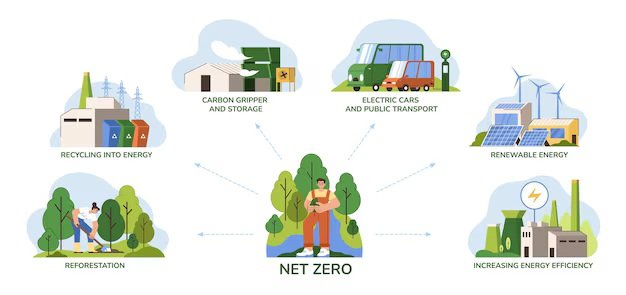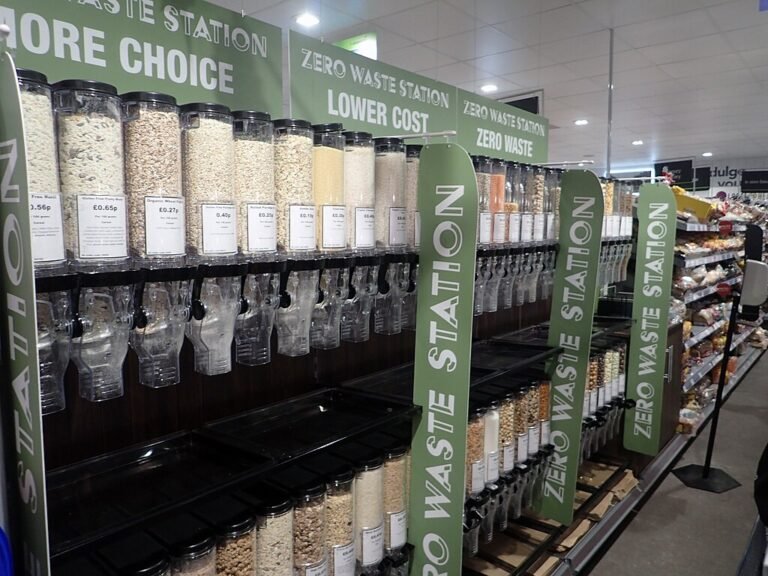13 Best Zero-Waste Kitchen Products: A Complete Guide to a Sustainable Kitchen
Household waste mainly comes from the kitchen. This is one area in your home where the trash can fills up with food waste, plastics, aluminium cans, glass bottles, and nearly every item purchased during grocery shopping. There’s no doubt that the kitchen is a hotspot for single-use plastics and other non-biodegradable waste. So, how can you reduce kitchen waste, especially single-use plastics that may end up in landfills or the ocean?
Let’s talk about transforming your kitchen into a zero-waste space. This is possible only if you adopt zero-waste principles and sustainable practices. In this guide, we’ll explore the best zero-waste kitchen products available on the market.
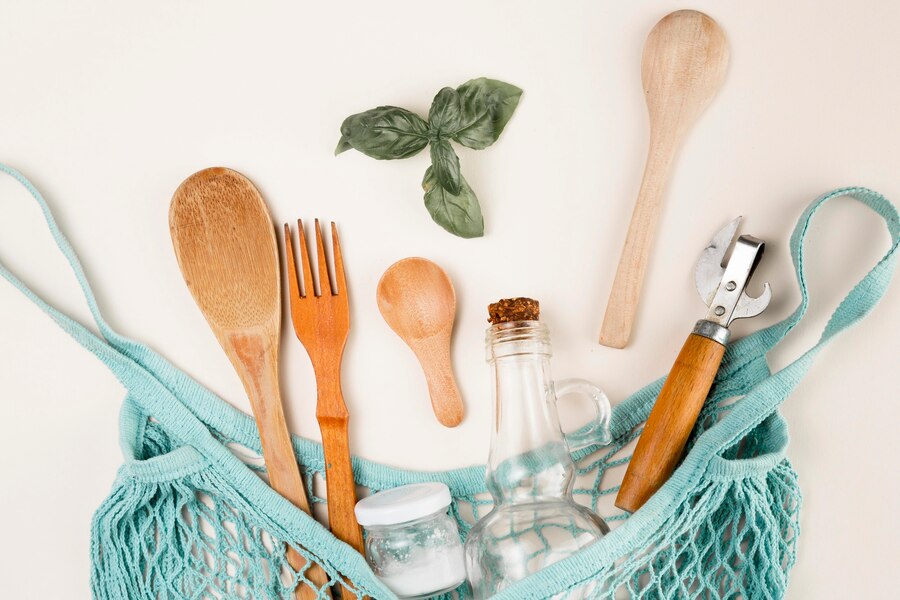
In This Article
- #1. Sustainable Cooking Pans
- #2. Reusable Food Bags
- #3. Compost Bins and Compostable Bags
- #4. Stainless Steel and Bamboo Utensils
- #5. Reusable Food Storage Container
- #6. Cloth Napkin
- #7. Beeswax Wraps
- #8. Stainless Steel and Bamboo Straws
- #9. Reusable Veggies Storage Bags
- #10. Cloth Produce Bags
- #11. Bamboo Dish Scrubbers
- #12. Wooden Dish Brushes
- #13. Salad Bowl and Salad Spinner in One
Why Zero-Waste in the Kitchen Matters
Most of the items purchased during grocery shopping end up in the kitchen. Unwrapping foodstuffs generates waste, so the kitchen trash can is often filled with plastics, cardboard, paper, aluminium foil, etc. Kitchens contribute significantly to:
- Packaging waste: According to statistics, on average, household globally generates about 150 kilograms of plastic waste annually—waste from materials like plastic bags, containers, foil, and wraps.
- Food waste: Over 30% of the food produced globally becomes food waste. This amounts to about 1.3 billion tons of wasted food annually.
- Single-use plastics: According to the U.S. Environmental Protection Agency (EPA), single-use plastics, including straws, utensils, bags, and bottles, all contribute to plastic pollution in the ocean.
Zero-Waste Kitchen Product: A Breakdown of the Best Sustainable Alternatives
#1. Sustainable Cooking Pans
Non-stick cookware has dominated the market for decades and is widely used in many homes today. While these cookware items with Teflon coatings may be convenient, they pose risks to both the environment and human health. Teflon-coated pans and pots contain Perfluorocarbons (PFCs). When heated above 260°C (500°F), the coating begins to break down, releasing toxic chemicals into the air.
A Better Alternative: Cast Iron and Ceramic Cookware
Switching to sustainable alternatives such as cast iron, stainless steel, and ceramic will lower your kitchen’s environmental footprint. These options are durable, toxin-free, and can be recycled indefinitely.
- Cast iron pans: These pans can last for decades while maintaining their efficiency. Unlike non-stick options, cast iron pans are safe and reliable for everyday kitchen use.
- Ceramic pans: Ceramic pans are also safe for kitchen use. Brands like GreenPan use ceramic coatings free from PFCs, ensuring that the cookware is both eco-friendly and safe to use.
Comparative Analysis
| Type of Cookware | Durability | Toxicity Risk | Environmental Impact | Price Range |
| Teflon-coated pans | Medium | High | High (Plastic-derived) | $10-$50 |
| Cast iron cookware | High | None | Low (recyclable) | $25-$200 |
| Ceramic cookware | High | None | Low | $30-$150 |
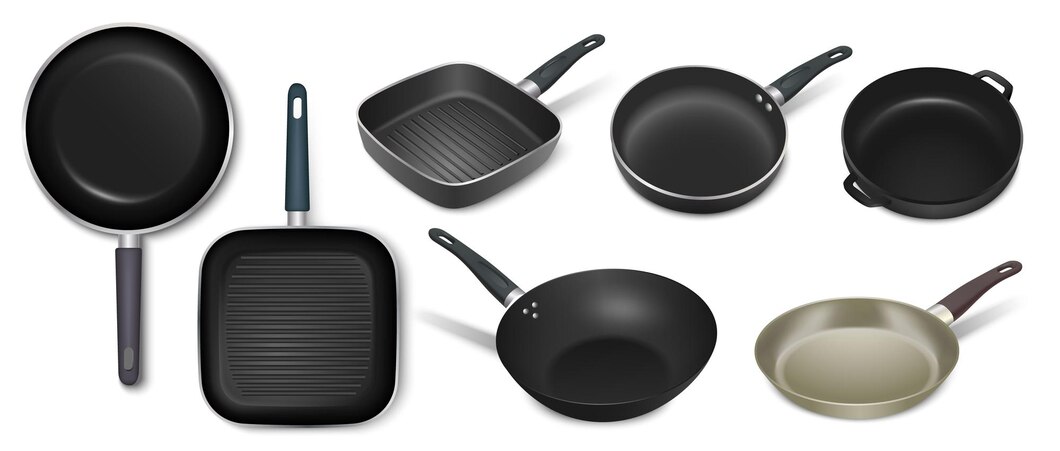
#2. Reusable Food Bags
Plastic bags, like Ziploc bags, have never been a sustainable option for food storage, yet they are widely used in homes today. On average, a family uses hundreds of these plastic bags annually, and most of these end up in landfills or, even worse, in the ocean.
Why Choose Reusable Bags?
Reusable food bags are made from non-toxic materials such as silicone and organic cotton. These bags are easy to carry, washable, reusable, and, most importantly, they naturally decompose without leaving any toxic residue.
- Silicone bags: Lightweight, durable, freezer-safe, and suitable for storing both dry and liquid foods.
- Organic cotton bags: Made from plant-based materials, safe for storing food such as fruits, vegetables, and bread.
Cost and Environmental Benefits
While eco-friendly, reusable bags may cost more upfront—for example, Stasher silicone bags range from $10 to $15—the investment is worth it. In the long run, you reduce the amount of plastic waste going to landfills, making it a cost-effective and environmentally conscious choice.
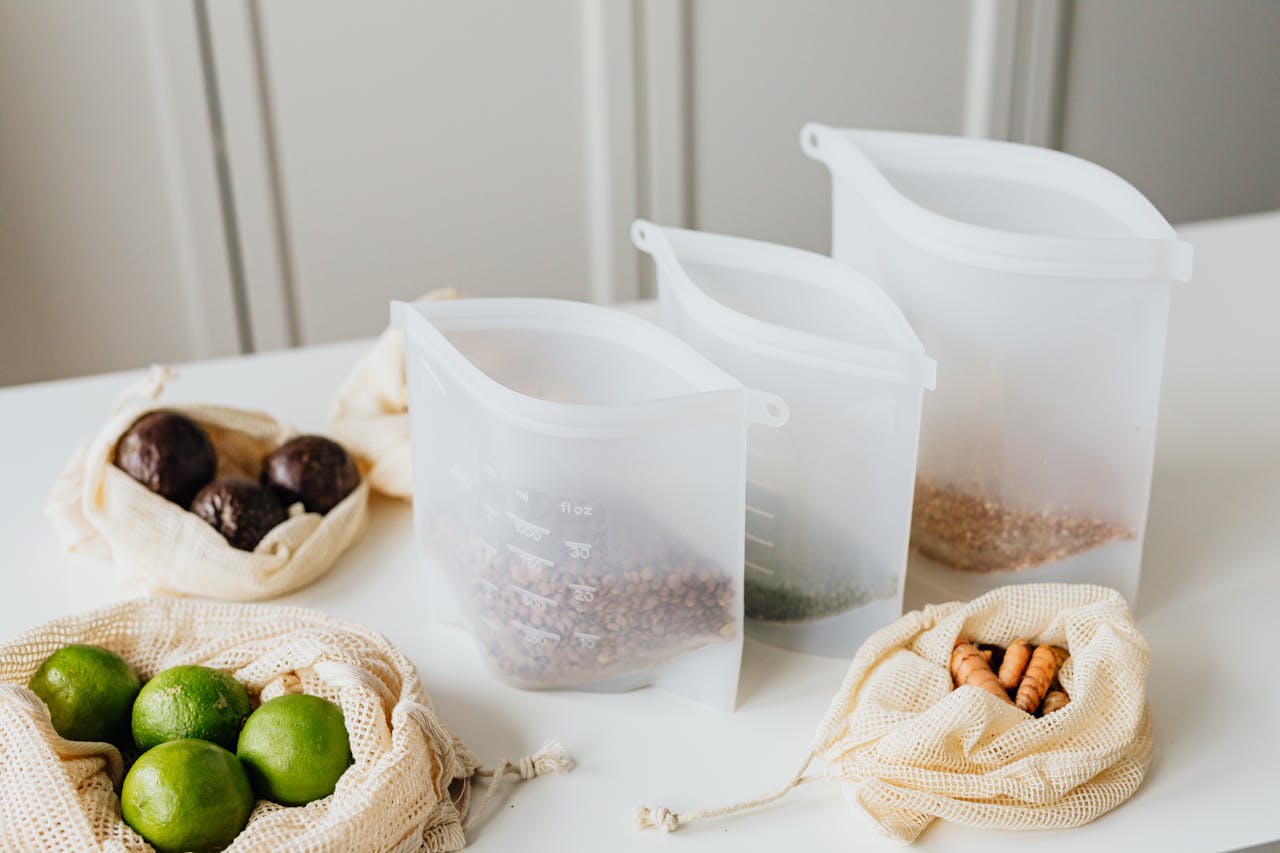
Learn More: 5 Best Eco-Friendly Disposable Cutlery Options
#3. Compost Bins and Compostable Bags
How about converting leftover food and other waste into nutrient-rich compost? That’s exactly what you can do with a compost bin and compostable bags. According to the National Resources Defence Council (NRDC), about 40% of food in the United States is wasted, much of which ends up in landfills.
Why Composting Is Essential
A compost bin for food waste converts organic material into nutrient-rich soil, which is a valuable organic fertiliser for farms and gardens. Composting food waste is an excellent way to reduce methane emissions from landfills.
- Countertop compost bins: These fit into small kitchen spaces and store food scraps before they are transferred to a larger compost pile.
- Compostable bags: Made from plant-based materials, these bags can be composted along with your food waste. Unlike plastic bags, compostable ones decompose quickly.
Composting Methods
- Indoor composting: Systems like vermicomposting (composting with worms) can effectively manage organic waste indoors.
- Outdoor composting: Traditional compost bins can be placed in your garden, where they will convert food waste into compost in about 2 to 3 months.
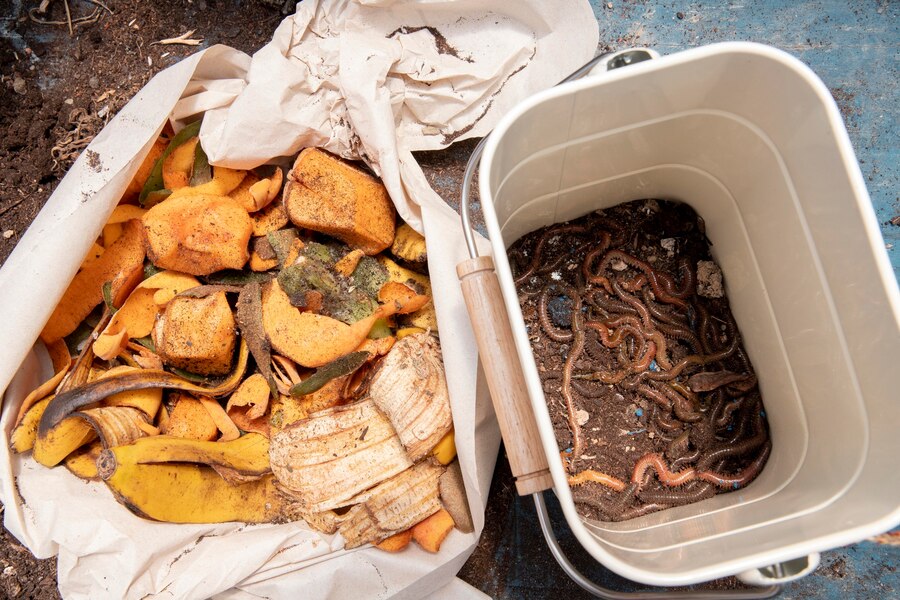
#4. Stainless Steel and Bamboo Utensils
Plastic utensils are easily discarded after use, contributing to the 40 billion single-use plastic utensils disposed of annually. Plastics are polluting our environment, as they can take hundreds of years to decompose.
Why Stainless Steel and Bamboo?
Durability and recyclability are the primary focuses that plastic utensils lack. Stainless steel utensils can last for generations and be recycled indefinitely, while bamboo utensils are lightweight, compostable, and biodegradable. These two sustainable alternatives should replace plastic utensils in your kitchen.
Bamboo cutlery sets are a popular choice, quickly gaining traction. They are safe to use and, at the end of their life cycle, can be composted or allowed to decompose naturally.
Environmental Impact of Materials
Bamboo is a reliable material used in various applications—it’s one of the fastest-growing plants on the planet and is widely available. Bamboo grows naturally without the need for fertilisers or pesticides.
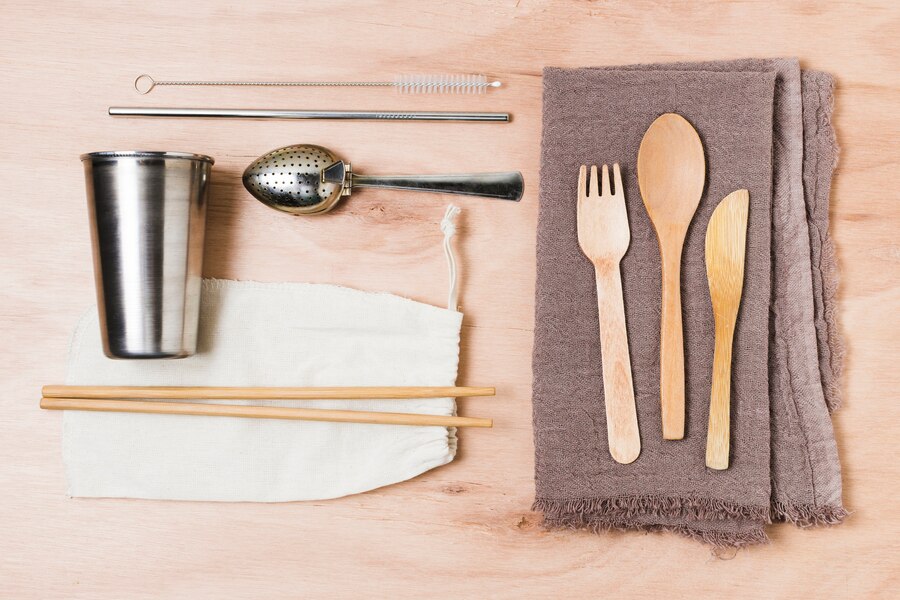
#5. Reusable Food Storage Container
When considering sustainable alternatives to single-use plastic, reusable food storage containers are an excellent option. Petroleum-based plastics may seem convenient, but they often contain harmful chemicals like Bisphenol A (BPA), which can leach into food over time.
Glass and Stainless Steel: The Best Alternatives
- Glass containers: Glass containers are more durable and healthier for storing food than plastic. They don’t stain or retain food odours, and they are easy to clean, making them ideal for food storage.
- Stainless steel containers: Stainless steel food storage containers are lightweight yet durable, with airtight lids that keep food fresh for extended periods, whether it’s hot or cold.
Silicone Lids and Bags
Silicone storage containers and reusable lids, such as Bee’s Wrap, are non-toxic and safe to use. Silicone is a durable material that won’t degrade with heat or cold, making it perfect for storing leftovers in the freezer or reheating in the microwave.
Comparative Analysis
| Material | Durability | Chemical-Free | Heat Resistance | Price Range |
| Plastic containers | Medium | No | Medium | $5-$20 |
| Glass containers | High | Yes | High | $10-$30 |
| Stainless steel | High | Yes | High | $15-$40 |
| Silicone bags | High | Yes | High | $10-$25 |
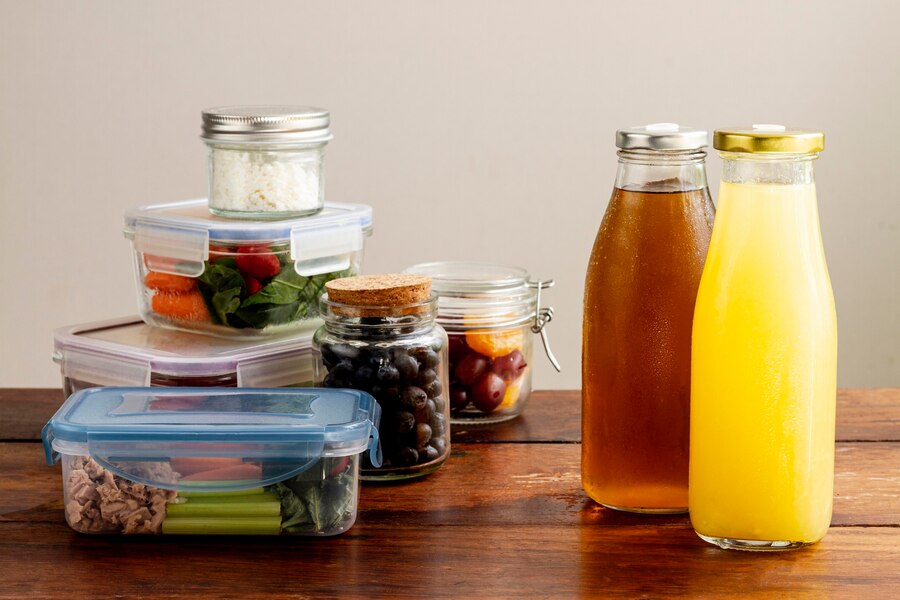
Learn More: How to Make Your House More Sustainable
#6. Cloth Napkin
The Environmental Cost of Paper Towels
It’s estimated that Americans use up to 13 billion pounds of paper towels annually, and most of this paper waste is dumped in landfills. The production process of paper towels is energy-intensive, and its demand for raw materials leads to the destruction of more trees. Cloth napkins are a sustainable option to replace paper towels. By using cloth napkins, you will reduce waste in your kitchen and lower the number of trees harvested to make paper towels.
Benefits of Cloth Napkins
Cloth napkins are durable, easy to wash, and can last for years. They are available in various fabrics like organic cotton, bamboo, or linen.
- Organic Cotton Napkins: These are made from pesticide-free cotton, making them softer and more sustainable than conventional cotton.
- Linen Napkins: Linen is an eco-friendly fabric that is durable and often gets softer with each wash.
Practical Tips
Next time you go grocery shopping, remember to pick up a few cloth napkins to replace paper towels.
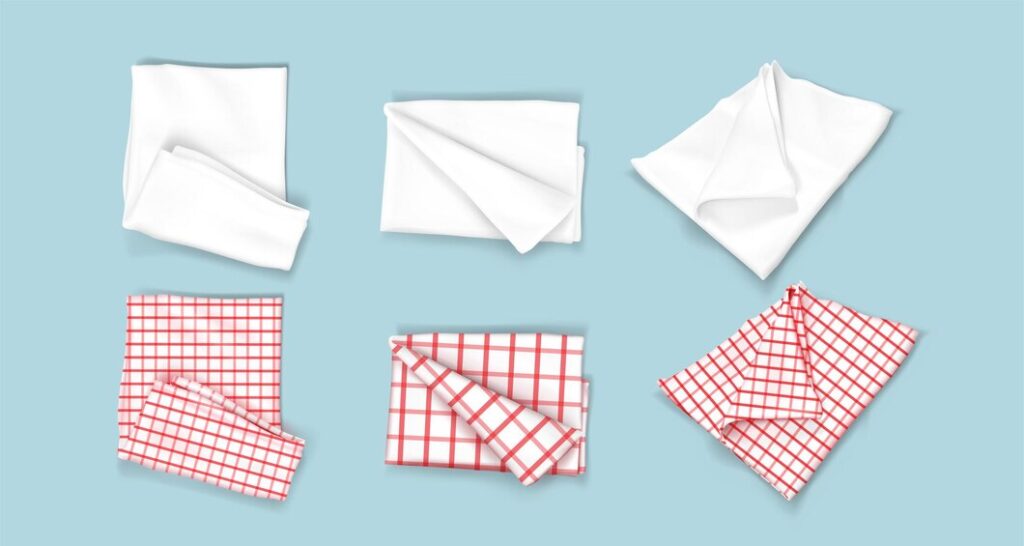
#7. Beeswax Wraps
.
Ditching Plastic Wraps
Plastic wrap is another form of plastic waste that is difficult to recycle and more likely to end up in landfills. Beeswax wraps are a sustainable and reusable alternative to replace plastic wraps in your kitchen. Made from organic cotton infused with beeswax, tree resin, and jojoba oil, these wraps are non-toxic and safe for covering bowls or wrapping sandwiches and fruits.
How to Use Beeswax Wraps
Beeswax wraps are activated by the warmth of your hands. Mould the wrap around the dish or item, and it will stay in place. After use, wash the wrap with cold water and mild soap before air drying it.
Longevity and End-of-Life Composting
Beeswax wraps can last up to a year if properly handled. When worn out, these wraps can be composted or repurposed as fire starters. Brands like Abeego or Bee’s Wrap offer re-waxing kits to extend the life of your wraps.
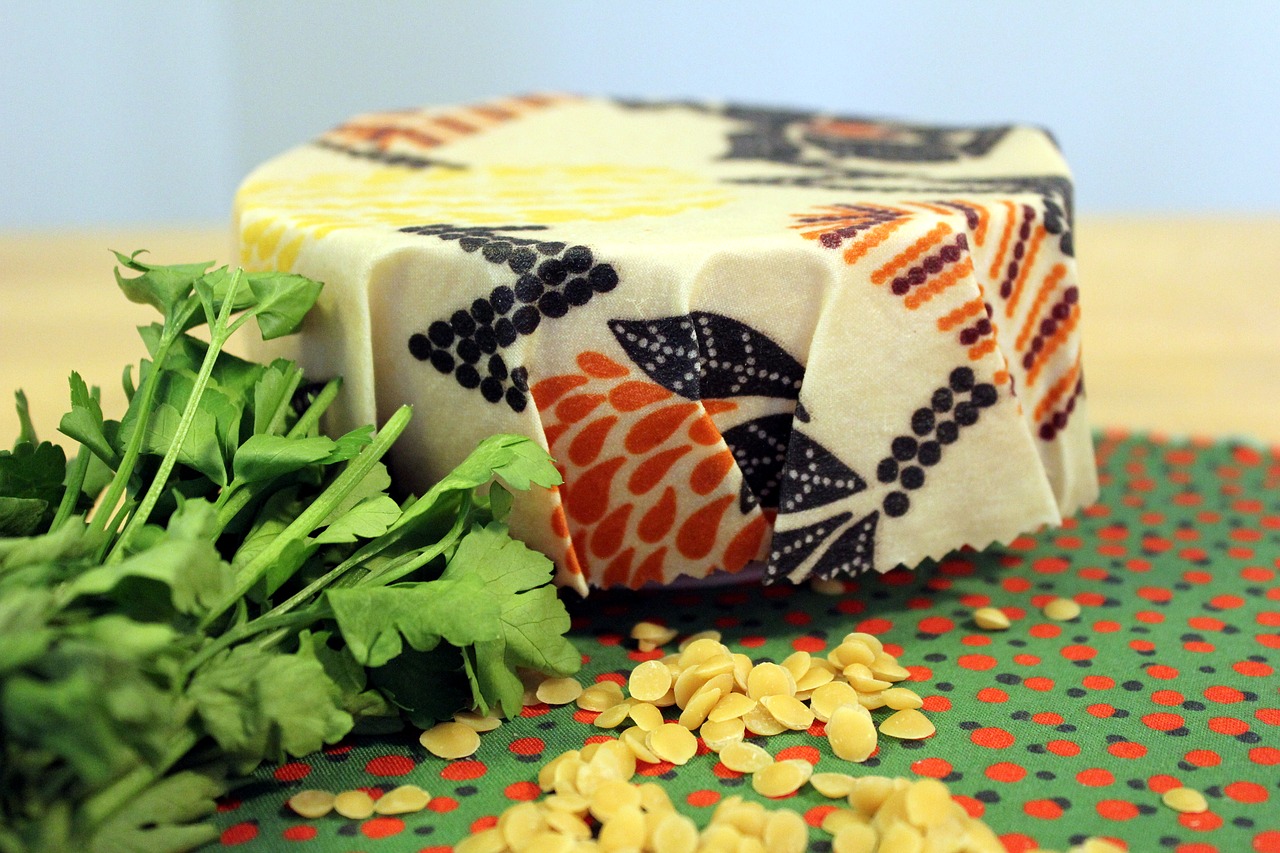
#8. Stainless Steel and Bamboo Straws
Plastic straws are among the most common waste items found in oceans and on beaches. This is one of the reasons why single-use plastics are banned in some tourist destinations worldwide.
Why Choose Reusable Straws?
Stainless steel and bamboo straws are reusable, more sustainable, and more durable than plastic straws. These eco-friendly straws are easy to clean and can last for years when properly cared for.
- Stainless steel straws: Easy to clean, durable, and ideal for cold drinks.
- Bamboo straws: Super lightweight, biodegradable, and the perfect plastic-free option for eco-conscious consumers.
Considerations for Reusable Straws
While some people find stainless steel straws too cold or metallic-tasting, they remain one of the best options for long-term use. Bamboo straws also replace plastic straws as a suitable alternative for reducing waste.
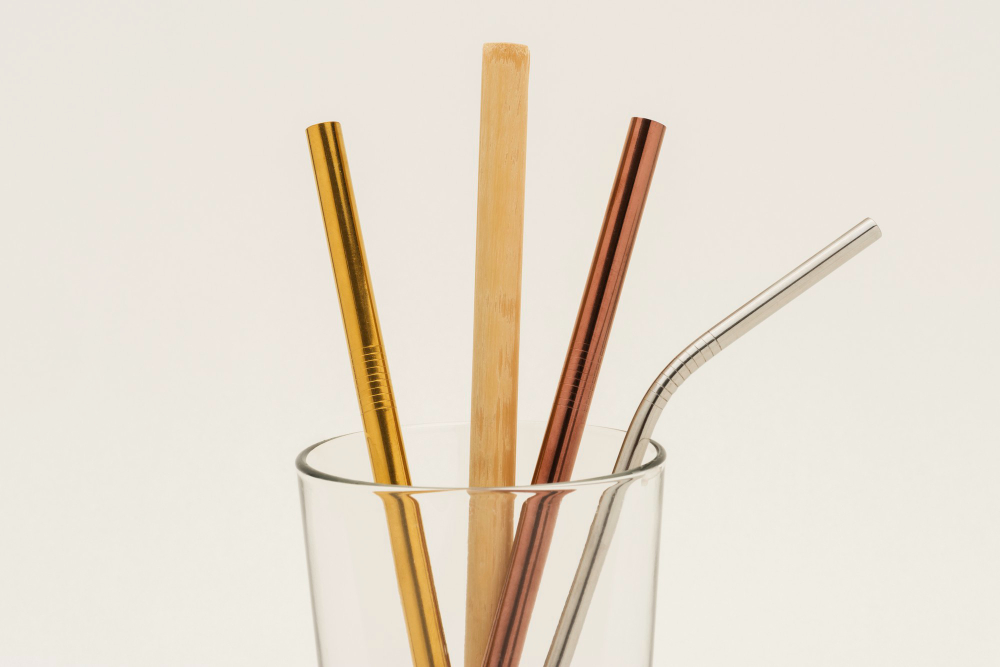
#9. Reusable Veggies Storage Bags
Using plastic bags to store fruits and veggies can make them spoil faster. We recommend using reusable veggie storage bags, a better option to keep fruits and vegetables fresh for longer.
How Do Reusable Storage Bags Work?
These bags are made from organic cotton or hemp and are naturally designed to be breathable, allowing ethylene gas to escape, which reduces the risk of mould.
- Cotton mesh bags: Ideal for storing leafy greens, apples, and other produce.
- Hemp bags: Perfect for keeping carrots, potatoes, and onions fresh.
Environmental Impact
By switching to reusable produce bags, you can help reduce the 5 trillion plastic bags used globally every year. Most reusable bags are machine washable and can last for years before needing replacement.
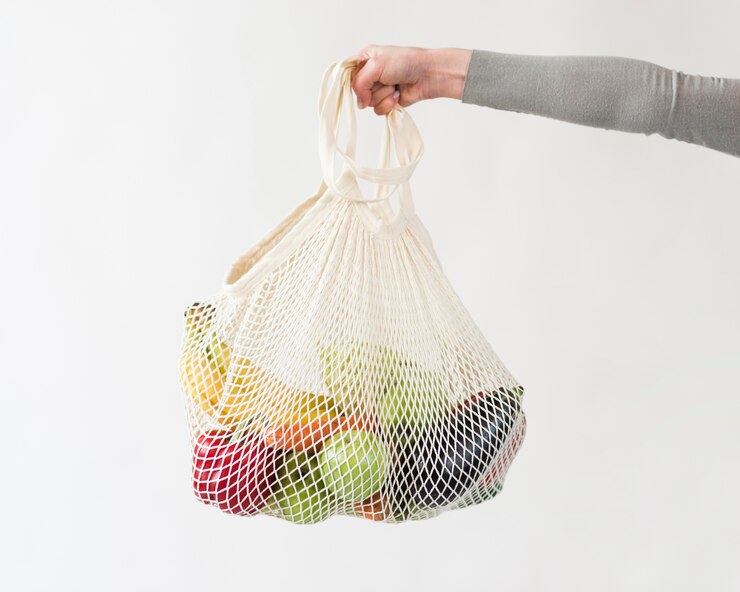
#10. Cloth Produce Bags
Avoid bringing plastic bags into your home by using cloth produce bags. Plastic bags handed to most people at grocery stores are not recyclable, so it’s best to resist the temptation to bring any into your home.
Benefits of Cloth Produce Bags
Cloth produce bags are washable, lightweight, and easy to carry fruits and veggies from the grocery store to your home. These bags are available in different sizes and materials, such as linen and organic cotton.
- Mesh cotton bags: These are safe, breathable bags for grocery shopping.
- Solid cotton bags: Durable and ideal for storing dry foods like beans, grains, and rice.
Practical Tip
Get a cloth produce bag and make sure to carry it with you when you go to the grocery store. Place it in the wash for a quick clean, and reuse it for your next grocery trip.
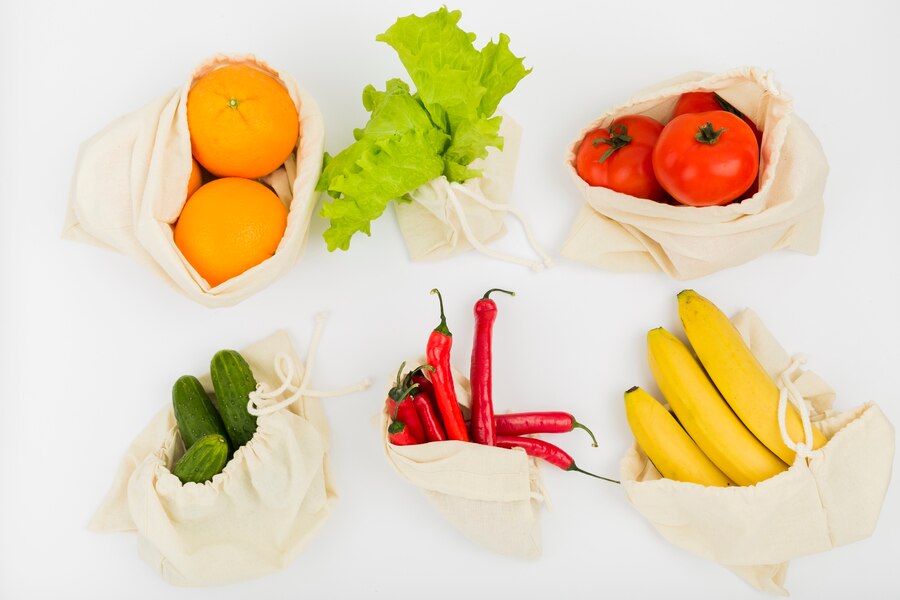
Learn More: Why Is Plastic Pollution Bad for the Environment? What You Need to Know
#11. Bamboo Dish Scrubbers
Replace conventional dish sponges with bamboo dish scrubbers. Plastic sponges are often made from synthetic materials and, over time, can break down into microplastics. Using bamboo dish scrubbers helps keep your dishes clean and free from microplastics.
Why Choose Bamboo?
Bamboo is a sustainable material. It is durable, grows quickly, and biodegrades once discarded. The handles of bamboo dish scrubbers are biodegradable, and the bristles are often made from recyclable PET plastic or natural fibres.
Compostable Scrubbers
Bamboo scrubbers also feature replaceable heads, allowing you to compost the worn-out bristles and replace them with new ones.
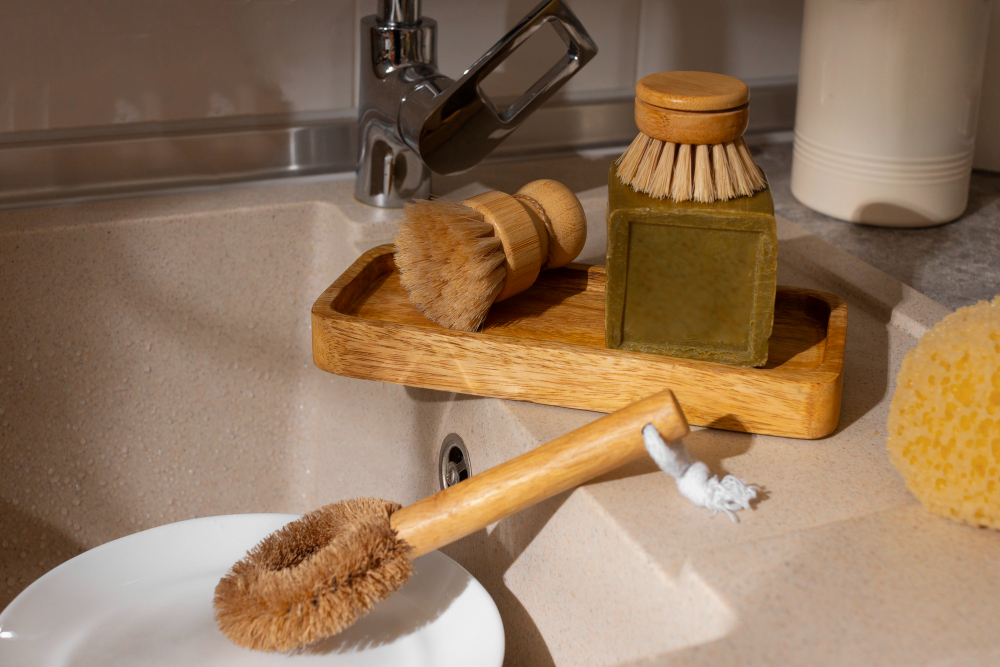
#12. Wooden Dish Brushes
Wooden dish brushes are an ideal replacement for plastic ones. These brushes are durable, easy to clean, and often come with replaceable heads, ensuring long-term use for a more sustainable product.
Why Choose Wooden Dish Brushes?
Wooden dish brushes are thoughtfully designed with wooden handles and bristles made from materials like coconut fibres or sisal, contributing to eco-friendliness.
End-of-Life Disposal
When your wooden brush is worn out, you can simply compost both the handle and the bristles. Brands like Redecker and Iris Hantverk offer high-quality wooden dish brushes that are built to last.

#13. Salad Bowl and Salad Spinner in One
This is a sustainable kitchen product ideal for a plant-based diet. The OXO Stainless Steel Salad Spinner is a plastic-free option. It features a durable stainless steel bowl, making it a long-lasting kitchen tool.
Salad spinners are essential kitchenware for individuals who prefer a plant-based diet. Most salad spinners are made from petroleum-based plastics. Now, let’s consider a more durable alternative: the stainless steel salad spinner.
The OXO Stainless Steel Salad Spinner
The OXO Stainless Steel Salad Spinner combines a durable stainless steel bowl with a BPA-free spinning mechanism. It’s perfect for washing and drying greens, and the stainless steel bowl can also double as a serving dish.
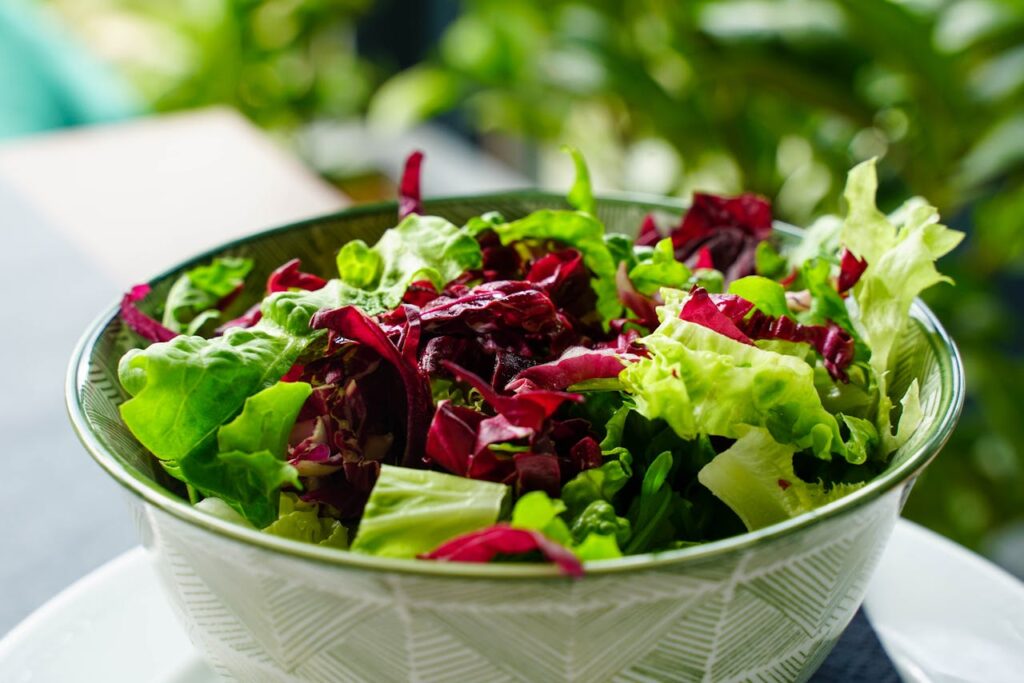
Conclusion
Upgrading your kitchen to a zero-waste space doesn’t have to happen overnight. We recommend taking one step at a time and gradually transitioning with these 13 innovative zero-waste products.
There are a variety of options to choose from: reusable bags, bamboo and stainless steel utensils, compost bins, cloth napkins, and reusable straws are all available to help you replace single-use plastics in your kitchen. Not only will these changes benefit the environment, but they’ll also make your kitchen more organised, healthier, and cost-effective in the long run.
The journey to zero-waste living begins in the kitchen. Why not start today?


